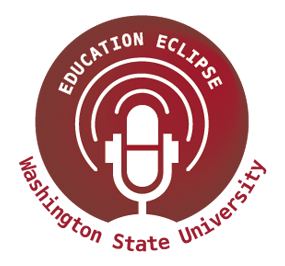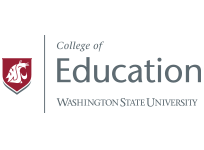The Vault
That doesn't mean the ideas presented are out-of-date next week! So we're giving you access to all our podcasts here.
.

We talk about STEM all the time. Well, since half of STEM is math and science, it stands to reason that a doctoral program that has both of those in it might be fairly important. The Washington State University College of Education has just that. The Mathematics and Science Education program is led by Dave …
On this edition of Education Eclipse, intern Brittni Willis sits down with Pullman Police officer Riley Myklebust. In addition to Officer Myklebust having been ASWSU president during his time as a student, he was actually a College of Education graduate. So how does a guy who is an elementary ed major become a cop? And, …
STEM stands for Science, Technology, Engineering, and Math. In a complex world, with complex societal grand challenges, it’s important for our nation’s youth to be equipped with the knowledge and skills to solve these tough challenges. Yet, how we teach these is also under the microscope then. STEM Education is a passion of Tamara Holmlund …
There’s never been a more important time to have really good teachers. And, as long as we’re talking about teachers, we might as well talk about school principals. Whenever you hear about a school turn-around, or an amazing reform effort, one of the indispensable components of these is a good principal. On the flip side, …
Salina King is a recent graduate from the College of Education. You could say that she’s doing a victory lap as she is using this Fall 2016 semester to finish her program and receive her teaching certification. She’s student teaching in a 4th grade classroom in Colfax, WA.
Today’s education requires more than just the status quo. That’s where Washington State University’s College of Education comes in. The college has a dynamic statewide educational leadership program, including superintendent certification, principal certification, and the best, most well-respected educational doctorate program in the state. One of the college’s ed doctorate grads is Jared Hoadley, the …
Continue reading "024 Making a difference through educational leadership"
Right now, there’s a big focus at Washington State University on the health sciences. WSU Spokane has the new medical college, the College of Nursing, and the College of Pharmacy. However, only select populations tend to gravitate toward careers in the health sciences. There are definitely underrepresented groups of students. Janet Frost is a clinical …
Continue reading "023 Health Science STEM Education Research Center"
The Centers for Disease Control and Prevention states that one out of four older people, meaning 65 and older, falls every year, but less than half tell their doctor. One out of every five falls causes a serious injury such as broken bones or a head injury. There’s also a tremendous cost attached to falls. …
Continue reading "022 Improving balance among pregnant women"
A new fitness program is being introduced at Washington State University. The president and provost offices are giving financial support to the program, while the College of Education is administering the program, due to its scholarly research in sport science and athletic training. The program is called Cougar Employee Wellness Program, and is for all …
Continue reading "021 Setting up an employee wellness program"
Imagine the difficulties of being a student in the U.S. while also being an immigrant. On the WSU Tri-Cities campus, Eric Johnson researches the difficulties, and talks about the engagement he does in this field that helps the students, as well as the teachers who teach those students.
The Carnegie Project on the Education Doctorate (CPED) is a group of 80 colleges and schools of education, all of whom have committed resources to work together and strengthen the educational doctorate. The WSU College of Education was one of the founding members of CPED. While the college has always had a very strong ed …
If you hadn’t heard of augmented reality before, you probably have by now! That’s the technology behind the worldwide Pokémon GO craze. Augmented reality has both similarities, and differences than virtual reality. Special education professor Don McMahon tells us what the difference is. So why would a special education professor talk with us about augmented …
Continue reading "018 Augmented Reality and the Assistive Technology Lab"
When it comes to student enrollment, most of the attention is spent on total enrollment, including record-breaking classes of incoming freshman. But, what good is it if the retention rate is terrible. How can universities hang on to students they do have? We talk to Evelyn Martinez, a recent WSU College of Education graduate. She …
Sustaining health is one of WSU’s identified societal grand challenges. Though some rates are improving, overall, we live in an age where physical activity is too low. According to the Centers for Disease Control and Prevention, only 1 in 5 American adults meet desired physical activity. Less than 3 in 10 high school students get …
Continue reading "016 Resistance Training and Running Economy"
Critical thinking is an essential skill for students to develop through their formal and informal education. The measurement of these skills is a challenge, especially with younger students. Several critical thinking assessments exist, yet their validity is in question. Educational Psychology doctoral student Latisha Sternod talks about her research in this arena, and gives implications …
Sports are part of our culture. We might remember playingbaseball or soccer as a kid. Perhaps we played some pick-upbasketball after schools. Or a nice flag football game in the briskautumn weather. Working in sports can be a little different then you think.Until you’re in the trenches, many don’t even know all thecomplexities of the …
English Language Learners are people learning English in addition to their native language. The Washington State University College of Education has a robust ELL program. The No Child Left Behind Act, as well as subsequent legislation, demanded educational success of all children, throughout the entire curriculum. Thus, children aren’t merely pulled aside and put in …
There have been almost 300 school shootings since Columbine, and the rate is increasing. When a school goes through something like this, how do the victims cope and recover? We spoke with doctoral candidate Patricia Maarhuis at the 2016 Academic Showcase about ways that schools, teachers, students, and communities can bounce back from devastation.
The past few years has seen increased awareness of racism and bigotry in our country. Of course racism has always been present, but today many are noticing a number of disturbing trends and incidents. Our national dialogue has increased on issues of institutional racism, a spike in blatant actions by some police against people who …
Chad Gotch is an educational psychologist working to bridge the gap between the test-makers and the test-takers. We talk with him about the educational video he’s working on to accomplish that, the importance of classroom assessment, and how we can improve students’ learning abilities.
Every year, the Alhadeff Future Teachers of Color hosts a conference where experts in educational diversity and social justice speak. Cheyenne Cortesi is an AFTOC ambassador, and talks about the group, the conference, the importance of diversity in education, and why she herself wanted to be a teacher.
Chris Connolly, assistant professor of kinesiology, explores the perceptions pregnant women have of exercising during pregnancy and explains the health benefits of doing so.
Elias Whitefoot is not only a kinesiology student, he’s one of the WSU College of Education’s student ambassadors. He also comes from a long line of Cougs (fourth generation). We talk to him about why he chose his degree, what he plans to do next, and some personal stuff, as well.
Young adults with disabilities remain among the most underrepresented demographic within the work force. U.S. Department of Labor stats show that they are employed nearly half as often as those without disabilities. One WSU College of Education professor has said working is one of the primary ways we achieve economic and social mobility, doesn’t it …
Continue reading "006 Predicting Employment Outcomes for Young Adults with Disabilities"
Twice a year, undergraduates earning a kinesiology degree from Washington State University have the opportunity to take part in the Bruya-Wood Undergraduate Research Conference. We talked with instructor Kim Holmstrom, who is a co-chair of the conference.
Dr. Richard Lamb is an assistant professor of science education technology. He’s also the director of Washington State University’s Neurocognition Science Lab and Data Center. He explains what that means and why it matters. It could make a huge difference in better understanding how kids learn, especially kids with disabilities.
Every year, new WSU College of Education faculty members take part in an intensive retreat to improve their writing skills for research articles and grant proposals. The college’s annual retreat also provides opportunities for creating community and motivating career progress. Only a few large, public universities in the country have colleges that offer such writing …
Meet the 2015 Inga Kromann Book Award winner, Sydney Freel, a junior pre-service teacher who won the annual honor (and $1,000) for her book Huckleberry Pie. She tells us what it’s about and what inspired her to write it.
While post-traumatic stress disorder (PTSD) has devastating effects on 5-17 percent of U.S. military veterans, those veterans who are Native American suffer PTSD at a much higher clip. One counseling psychology Ph.D. student (and Native American veteran) at Washington State University’s College of Education shares his research on the subject.

